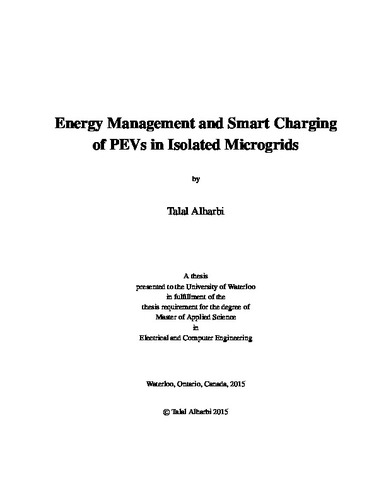| dc.description.abstract | Microgrids are defined as a cluster of loads and micro-resources operating as a single controllable entity that provides both power and heat to its local area.
Typically, these rely on conventional diesel generators, but with recent developments are expected to include more renewable energy sources (RESs),
battery energy storage systems (BESSs), and plug-in electric vehicles (PEVs).
Both RESs, such as wind and solar, and PEVs can reduce greenhouse gas (GHG) emissions significantly such as carbon dioxide (CO_2) which are released from burning fuel by generators or conventional vehicles.
Energy management in isolated microgrids is an important task since these have limited generation capacity and are expected to rely on various uncontrollable
resources to match and balance the demand-supply gap.
Moreover, PEVs present a promising solution to GHG emissions but on the other hand, their increased penetration can
impact power system operation, particularly so in isolated microgrids.
Therefore, PEV load management is considered to be a crucial issue.
Similarly, demand response (DR) has the potential to provide significant flexibility in operation of isolated microgrids with limited generation capacity,
by altering the demand and introducing an elasticity effect.
The present research work examines the impact of uncontrolled and controlled (smart) charging of PEVs using a comprehensive mathematical optimization model for short-term operation of the isolated microgrid.
This model determines optimal energy management solutions combining generation from different resources such as diesel generators, wind turbines, solar panels, and BESSs, and incorporates the DR options as well.
Furthermore, the thesis presents a stochastic optimization model after creating several probabilistic operational scenarios for energy management and smart charging of PEVs in short-term operation of the isolated microgrid considering fixed and optimal DR options.
The proposed stochastic optimization model studies the impact of wind and solar generation output variability as well as the effect of uncertain energy consumption patterns of customers; and also the stochastic nature of the state of charge (SOC) of the PEV battery at the start of charging.
Several case and scenario studies considering a modified CIGRE isolated microgrid benchmark test system, and using the proposed models are presented and evaluated, to obtain insights into the effect of smart charging vis-`a-vis uncoordinated charging accompanied by DR options in overall energy management of the isolated microgrid. | en |

